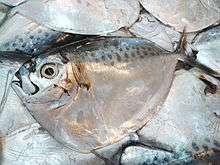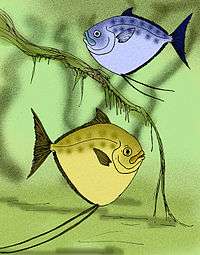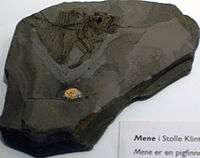Mene
The moonfish of the genus Mene, the sole extant genus of the family Menidae, are disk-shaped fish which bear a vague resemblance to gourami, thanks to their thread-like pelvic fins. Today, the genus is represented only by Mene maculata of the Indo-Pacific, where it is a popular food fish, especially in the Philippines, where it is known as bilong-bilong, chabita, hiwas or tahas.[2]
| Mene | |
|---|---|
 | |
| Mene maculata | |
| Scientific classification | |
| Kingdom: | Animalia |
| Phylum: | Chordata |
| Class: | Actinopterygii |
| Order: | Carangiformes |
| Family: | Menidae Fitzinger, 1873 |
| Genus: | Mene Lacépède, 1803 |
| Species | |
| |
| Synonyms | |
| |
As a genus, Mene has a long fossil history, with species found in marine sediments throughout the Cenozoic Era. The earliest accepted species, M. purdyi from the Paleocene of Peru, resemble later species, such as M. rhombea of the Monte Bolca lagerstätte, and even the living species, M. maculata. Experts remain undecided whether the Tunisian species, M. phosphatica is from the Lower Paleocene, thus making it older than M. purdyi, or whether it is from the Ypresian epoch of the Eocene. Almost all of the species are known primarily from the Paleogene; the Neogene record is rather sparse, if not totally nonexistent, with some otoliths found in Miocene strata, and no whole or even partial specimens known from Pliocene or Pleistocene strata.
Anatomical and recent molecular studies strongly suggest a relationship with the pomfrets, dolphinfishes, remoras and the jacks in the order Carangiformes.[3]
Gallery
 Mene oblonga and Mene rhombea restorations |
 Mene fossil at the Geological Museum, Copenhagen |
Timeline

References
- Sepkoski, Jack (2002). "A compendium of fossil marine animal genera". Bulletins of American Paleontology. 364: 560. Archived from the original on 2011-07-23. Retrieved 2007-12-25.
- Small-scale fisheries of San Miguel Bay, Philippines: options for management and research. ISBN 971-10-2208-7.
- J. S. Nelson; T. C. Grande; M. V. H. Wilson (2016). Fishes of the World (5th ed.). Wiley. p. 380. ISBN 978-1-118-34233-6.
